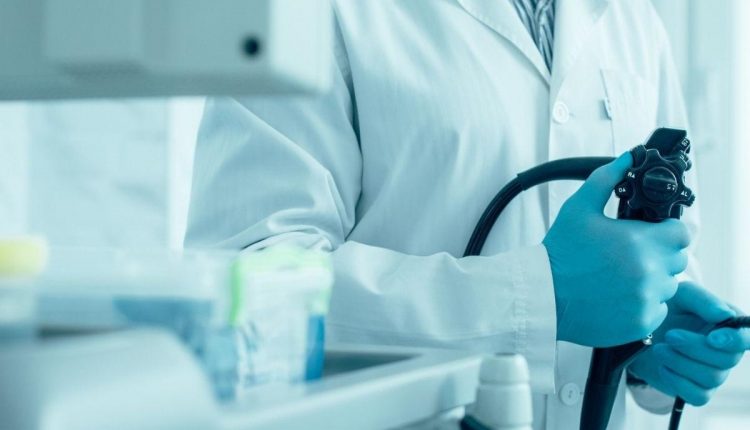
What is colonoscopy?
Colonoscopy is a diagnostic test that allows you to examine the surface of the colon and rectum by inserting, through the anus, a thin and flexible tube that is slowly advanced while introducing air to stretch the walls of the intestine
In recent years, to ensure better patient comfort, there is a tendency to replace air with carbon dioxide (CO2), which has the ability to be rapidly reabsorbed by the tissues, or alternatively with water, which allows for less relaxation of the intestine and, consequently, a reduced sensation of abdominal distension for the patient.
The colon consists of the last 130-150 centimeters of intestine, ending in the rectum and anus.
Colonoscopy, what is the preparation required?
The colon must be completely cleansed for an accurate and complete procedure, therefore the instructions must be strictly followed.
The preparations available vary in composition and in the volume of liquids to be taken.
Recently, preparations have been marketed that require the intake of low volumes, up to a single liter of solution, which in the same way guarantee adequate preparation for the exam, causing less discomfort to the patient.
Can I continue to take my medicines?
The patient should continue to take their usual medications, even on the morning of the procedure.
An exception is iron supplements, which must be stopped one week before the procedure.
Furthermore, while aspirin should not be suspended, if you are taking anticoagulants or other antiplatelet agents (such as pradaxa, xarelto, eliquis, lixiana, persantin, coumadin, sintrom, plavix or iscover), you will need to contact your doctor to define the modality of suspension in the days preceding the procedure.
What happens during a colonoscopy?
To make the procedure more comfortable, the patient is given an intravenous sedative.
The colonoscopy has an average duration of about 15-20 minutes and is generally well tolerated, but during the procedure it is possible to experience transient meteorism or cramps.
If the doctor thinks an area needs further evaluation, a biopsy (taking a sample of the lining of the colon) will be done for microscopic analysis.
These procedures are usually not painful.
What are polyps and why are they removed?
Polyps are bumps, mostly benign, on the surface of the colon. Their size can vary from a few millimeters to several centimetres.
Since tumors generally begin with a polyp, their removal, known as “polypectomy”, is an important means of preventing colorectal cancer.
Then, any polyps discovered during the colonoscopy will be removed by the doctor during the exam.
However, the external appearance does not always allow to distinguish a polyp from a malignant formation (tumor), therefore after removal they must be analyzed under a microscope.
Although colonoscopy is the most accurate method for identifying colon polyps and cancer, no test is foolproof and there is always a small chance that major lesions will go undetected.
This is especially true in the case of an inadequately cleansed bowel.
What happens after the colonoscopy?
The patient will have to be accompanied home and will not have to drive or make important decisions for the next twelve hours, as the faculty of judgment and reflexes may be slowed down due to the sedative drug administered.
There may be cramps or meteorism due to the air introduced during the exam.
All of this should quickly end with the gas escaping.
After the exam it will be possible to eat something.
What are the possible complications of colonoscopy?
Colonoscopy and polypectomy are generally safe procedures. A possible complication is given by the perforation or laceration of the intestinal wall, which in this case could require surgery in the most serious cases.
This complication is very rare (1/1000).
Bleeding may occur at the site of the biopsy or polypectomy, but it is often a non-significant phenomenon that can be treated endoscopically and only in very rare casecs may it require the need for blood transfusions and more invasive treatments (e.g. surgery).
Some patients may have cardio-respiratory problems following the administration of sedatives, or complications due to heart or lung disease.
Death is an extremely rare event in endoscopic procedures.
Read Also
Emergency Live Even More…Live: Download The New Free App Of Your Newspaper For IOS And Android
Colonoscopy: What It Is, When To Do It, Preparation And Risks
Colon Wash: What It Is, What It Is For And When It Needs To Be Done
Rectosigmoidoscopy And Colonoscopy: What They Are And When They Are Performed
Ulcerative Colitis: What Are The Typical Symptoms Of The Intestinal Disease?
Wales’ Bowel Surgery Death Rate ‘Higher Than Expected’
Irritable Bowel Syndrome (IBS): A Benign Condition To Keep Under Control
Intestinal Infections: How Is Dientamoeba Fragilis Infection Contracted?
Study Finds Link Between Colon Cancer And Antibiotic Use
Colonoscopy: More Effective And Sustainable With Artificial Intelligence
Colorectal Resection: In Which Cases The Removal Of A Colon Tract Is Necessary
Gastroscopy: What The Examination Is For And How It Is Performed
Gastro-Oesophageal Reflux: Symptoms, Diagnosis And Treatment
Endoscopic Polypectomy: What It Is, When It Is Performed
Straight Leg Raise: The New Manoeuvre To Diagnose Gastro-Oesophageal Reflux Disease
Gastroenterology: Endoscopic Treatment For Gastro-Oesophageal Reflux
Oesophagitis: Symptoms, Diagnosis And Treatment
Gastro-Oesophageal Reflux: Causes And Remedies
Gastroscopy: What It Is And What It Is For
Colonic Diverticular Disease: Diagnosis And Treatment Of Colonic Diverticulosis
Gastro-Oesophageal Reflux Disease (GERD): Symptoms, Diagnosis And Treatment
Diverticula: What Are The Symptoms Of Diverticulitis And How To Treat It
Irritable Bowel Syndrome (IBS): A Benign Condition To Keep Under Control
Gastroesophageal Reflux: Causes, Symptoms, Tests For Diagnosis And Treatment
Non-Hodgkin’s Lymphoma: Symptoms, Diagnosis And Treatment Of A Heterogeneous Group Of Tumours
Helicobacter Pylori: How To Recognise And Treat It
A Baby’s Gut Bacteria May Predict Future Obesity
Sant’Orsola In Bologna (Italy) Opens A New Medical Frontier With Microbiota Transplantation
Microbiota, The Role Of The ‘Gate’ That Protects The Brain From Intestinal Inflammation Discovered
What Are The Differences Between Diverticulitis And Diverticulosis?
When Is A Colonoscopy With Biopsy Necessary?
What Is A Double Contrast Barium Enema?



